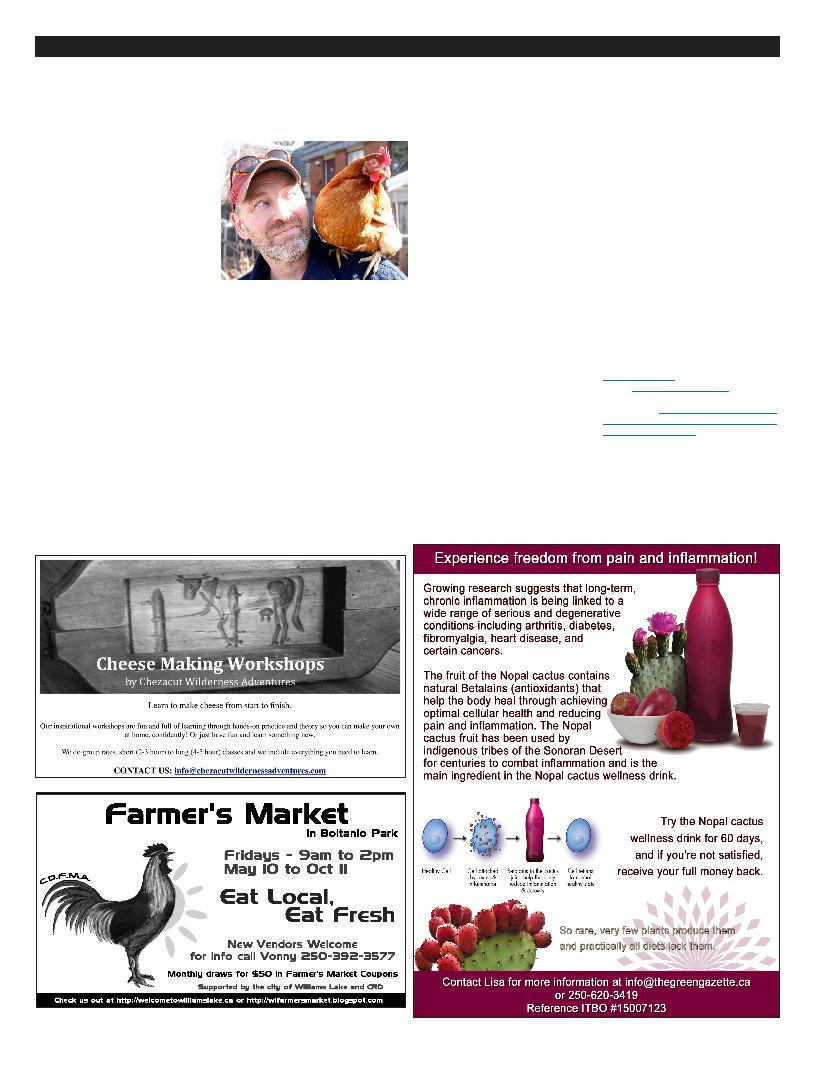
or the egg? Well actually it
was the pigeon. In 2003,
Paul Hughes was living on
young son when he got his first flock of
laying hens. Tending the chickens was a job
on the farm he was particularly fond of
teaching his son. He was able to show his
son that free-range chickens don't smell,
they're easy to care for, they aren't noisy,
and they provide really nutritious food.
reward was fresh eggs collected daily, that
became the basis for their home cooking and
fresh shakes. When his son was six they
moved to the Killarney area of Calgary, Al-
berta and found what they thought was the
perfect property that would allow them to
continue to keep chickens and continue to
have fresh eggs.
started the Calgary Food Policy Council
(CFPC), which supports and promotes food
sustainability within the city of Calgary.
Through his dealings with city council,
Hughes soon learned that he was in fact not
allowed to legally keep chickens, but he was
allowed to have 10 dogs, 10 cats, and 150
pigeons, not to mention snakes and a few
other species.
pigeons were allowed, why weren't chick-
ens? He was informed that because there was
a pigeon club, pigeons were allowed. He
hung up the phone and spent a long 10 min-
utes thinking on this, and decided to form
CLUCK--the Calgary Liberated Urban
Chicken Klub.
and told them there was now a chicken club.
He also inquired about the process to allow
for the keeping of chickens in the city of
Calgary. Hughes was told there was no appli-
cation to file; in fact, there was an
"overbroad prohibition" against keeping live-
stock in the city of Calgary and chickens
were classified livestock.
chickens because, like him, they wanted to
know where their food was coming from. He
continued fighting the cause and participated
in an application for an Urban Egg Laying
Pilot Project. This project was to include
professionals in the community such as pro-
fessors, lawyers, doctors, and representatives
from the Canadian Food Inspection Agency.
Members of the chicken community were
going to open their gates to the professionals
for one year so they could come in and take
samples of soil, blood, and eggs and inter-
view the CLUCK chicken owners. There
were over 300 letters of support for the pro-
ject, and good representation at the meeting.
The evening of the presentation to council
three doctors spoke in favour of the project
and only one person spoke against it. The
project was voted down.
for "possessing and keeping livestock" in the
city of Calgary was, and is, $200. In order to
challenge them, he had to have committed an
offence, so he turned himself in and was
given the bylaw citation. This gave him the
ability to file a case with the Province of
Alberta under Article 25 of the United Na-
tions Human Rights Declaration and the Ca-
nadian Charter of Rights and Freedoms.
which obtains its authority from the provin-
cial government, which in turn derives its
authority from the federal government and
the Canadian constitution. Therefore, munici-
palities can only make bylaws affecting the
municipality.
and further states,"
constitutional and therefore illegal."
Hughes has found it a struggle, but has had
his day in court and was not successful after
the initial decision was handed down. There
is now a legal team of four lawyers working
on the appeal.
were lots of opportunities to get a lot of in-
formation heard." He feels strongly that if he
doesn't win at this level, the door is wide
open to proceed to the next.
that comes the press. It wasn't long before
his story had gone national and he was being
contacted by people across the country also
trying to push to have backyard chickens
approved in their communities.
the country. It is all done on a zero budget
and anyone with a passion for right to food
or food justice can join. For more info, con-
tact Paul Hughes at CLUCK Canada at
passion for hobby farming since they met
almost 30 years ago. "Our goal at Funky
Fowl Farm is to grow everything we need to
live, and to grow as naturally possible."